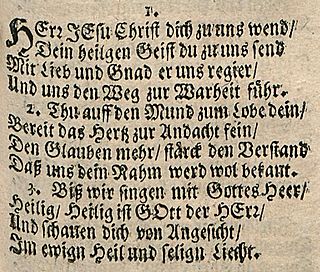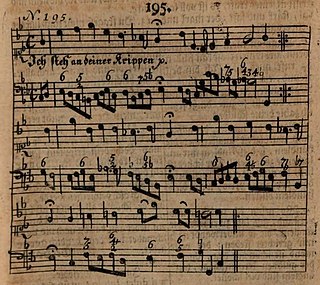Related Research Articles

The Genevan Psalter, also known as The Huguenot Psalter, is a metrical psalter in French created under the supervision of John Calvin for liturgical use by the Reformed churches of the city of Geneva in the sixteenth century.

Psalm 138 is the 138th psalm of the Book of Psalms, generally known in English by its first verse, "I will praise thee with my whole heart". The Book of Psalms is found in the third section of the Hebrew Bible, and a book of the Christian Old Testament. In the Greek Septuagint version of the bible, and in its Latin translation in the Vulgate, this psalm is Psalm 137 in a slightly different numbering system. In Latin, it is known as "Confitebor tibi Domine in toto corde meo". The psalm is a hymn psalm.

Nikolaus Herman was a German Lutheran cantor and teacher, creating numerous Protestant hymns. Some of them are contained in hymnals in several languages.

"Du meine Seele singe" is a hymn in German by Paul Gerhardt, a paraphrase of Psalm 146. Johann Georg Ebeling wrote the well-known melody in 1666. The song in 10 stanzas was first published in 1667 in the collection Pauli GerhardiGeistliche-Andachten of songs by Gerhardt. It is No. 302 in the current Protestant hymnal Evangelisches Gesangbuch.

"Herr Jesu Christ, dich zu uns wend" is a Lutheran hymn from the 17th century, which was for a long time a prominent hymn, set by several composers. It was translated into English and is part of modern hymnals.
"Der Geist des Herrn erfüllt das All" is a Christian hymn for Pentecost by Maria Luise Thurmair, written in 1941. First printed in 1946, it appeared with a 1609 melody by Melchior Vulpius in the German Catholic hymnal Gotteslob in 1975 as GL 249. It has been included in ecumenical hymnals and songbooks.

"In dich hab ich gehoffet, Herr" is a Lutheran hymn in seven stanzas, written by Adam Reusner and first published in 1533. He paraphrased the beginning of Psalm 31. It was first sung to the melody of a Passion hymn. The melody connected with the hymn in 1560 was derived from models dating back to the 14th century. A third melody from 1608 became a hymn tune for several other songs and translations to English. In the German Protestant hymnal Evangelisches Gesangbuch, the hymn appears as EG 257 with the second melody. Johann Sebastian Bach used the second and third melodies in chorale preludes, and the third also in cantatas and the St Matthew Passion.

"Nun danket all und bringet Ehr" is a German Lutheran hymn in nine stanzas, with a text written by Paul Gerhardt. It was first published in 1647, in Johann Crüger's Praxis pietatis melica which was the first publication of hymns by Gerhardt. In the 1653 edition, Crüger added a melody that he composed. As a general song of thanks, the song has appeared in several hymnals, including the German Protestant hymnal Evangelisches Gesangbuch and the Catholic hymnal Gotteslob. It has inspired musical settings by composers from the 17th to the 21st century. Johann Sebastian Bach used the first stanza in a cantata, however with the melody of "Lobt Gott, ihr Christen alle gleich", Hugo Distler composed a chorale cantata, and Günter Berger based a toccata for organ on it.
"Den Herren will ich loben" is a Christian hymn by Maria Luise Thurmair, based on the Magnificat and set to a 1613 melody by Melchior Teschner, which was used for "Valet will ich dir geben". The hymn in three stanzas of eight lines was first written in 1954, and revised in 1971. It appeared in the Catholic hymnal Gotteslob in 1975, and in the current Gotteslob, but also in a German Protestant hymnal. A general song of praise, it has been set to music several times.

"Macht hoch die Tür" is a German popular Advent hymn, written in Ducal Prussia in the 17th century. The incipit is the first line, "Macht hoch die Tür, die Tor macht weit. The lyrics were written by Georg Weissel in 1623, for the inauguration of the Altroßgärter Kirche in Königsberg. The melody that is now associated with the text appeared first in 1704 in the hymnal by Johann Anastasius Freylinghausen.

"Ich steh an deiner Krippen hier" is a German Christmas hymn, with lyrics by Paul Gerhardt which were first published in 1653. It was then sung with an older melody by Martin Luther, but a melody which was likely created by Johann Sebastian Bach for Georg Christian Schemelli's Musicalisches Gesang-Buch of 1736 is now part of current Protestant and Catholic hymnals.

"Freu dich, Erd und Sternenzelt" is a German Christmas carol. The text and melody are based on the Czech carol "Narodil se Kristus pán", which was derived around 1500 from a Latin model, "En Virgo parit filium", The Czech song is regarded as the most popular Czech carol.

"Zu Bethlehem geboren" is a German Christmas carol. The text is attributed to Friedrich Spee, and was first printed in the collection Geistlichen Psälterlein by Johannes Heringsdorf in Cologne in 1637. The author was unknown until the 20th century, but research of style and content arrived at the attribution. The song was printed with a then-popular secular melody in 1638. The song appears in current Catholic and Protestant hymnals.

"Christ fuhr gen Himmel" is a German Ascension hymn. The church song is based the medieval melody of the Easter hymn "Christ ist erstanden". It was an ecumenical song from the beginning, with the first stanza published in 1480, then included in a Lutheran hymnal in 1545, and expanded by the Catholic Johannes Leisentritt in 1567. It appears in modern German Catholic and Protestant hymnals, and has inspired musical settings by composers from the 16th to the 21st century.
"Wir wollen alle fröhlich sein" is a German Easter hymn, with a text mostly by Cyriakus Schneegass, who added to an older first stanza, and a 1544 tune by the Bohemian Brethren. It was published in Wittenberg in 1573.
"Nun jauchzt dem Herren, alle Welt" is a German Christian hymn, a paraphrase of Psalm 100. The text was written by David Denicke and published in a 1646 hymnal. The song is contained in German hymnals, the Protestant Evangelisches Gesangbuch and the Catholic hymnal Gotteslob.

"Im Frieden dein, o Herre mein" is a three-stanza German Christian communion hymn. In 1527 the early Reformer Johann Englisch wrote two stanzas as a rhyming close paraphase of the Nunc dimittis, or Canticle of Simeon. The hymn is sung to a melody by Wolfgang Dachstein, written before 1530. Friedrich Spitta revised the lyrics in 1898 and added a third stanza. His revision transformed Englisch's prayer of an individual with a focus on a peaceful death to a communal one more about peaceful life in unity.

"Gott ist gegenwärtig" is a Christian hymn in German by the Reformed writer Gerhard Tersteegen, published in 1729, based on a 1680 melody by Joachim Neander. The hymn, with the melody simplified, is part of the Protestant hymnal Evangelisches Gesangbuch as EG 165 and the 2013 Catholic hymnal Gotteslob as GL 387. Seven of its eight stanzas are part of the Mennonite hymnal as No. 1. The hymn is regarded as an expression of Christian mysticism. It was translated to English in various versions.

"Dein Lob, Herr, ruft der Himmel aus" is a German Catholic hymn. Adolf Lohmann adapted a 1659 hymn by the Jesuit astronomer Albert Curtz, who paraphrased Psalm 19. The melody appeared in Augsburg in 1669. It was No. 1 in the 1938 hymnal Kirchenlied and is part of the German Catholic hymnal Gotteslob as GL 381.
"Nun lässest du, o Herr" is a Christian hymn by Georg Thurmair written in 1966 as a paraphrase of the Nunc dimittis canticle. It was part of the German Catholic hymnal Gotteslob of 1975 as GL 660 with a 16th-century melody by Loys Bourgeois. With this melody, it is also part of the Protestant hymnal Evangelisches Gesangbuch as EG 695. It is part of the second edition of the Gotteslob as GL 500, with a new 1994 melody.
References
- 1 2 3 4 "Gesänge – Woche – Gesänge zur Eröffnung". mein-gotteslob.de (in German). Retrieved 12 August 2018.
- 1 2 Dutzmann, Martin (11 August 2012). "Mein ganzes Herz erhebet dich (eg 634)". kirchezumhoeren.de (in German). Retrieved 19 August 2018.
- 1 2 Grub, Udo (2012). Evangelische Spuren im katholischen Einheitsgesangbuch "Gotteslob" von 1975 (in German). Münster: LIT Verlag. pp. 209, 213. ISBN 978-3-64-311663-5.
- ↑ Grunewald, Eckhard, Henning P. Jürgens and Jan R. Luth (eds.) (2004). "Die deutsche Neutextierung des Genfer Psalters durch Matthias Jorissen (1798)." in Der Genfer Psalter und seine Rezeption in Deutschland, der Schweiz und den Niederlanden. Max Niemeyer Verlag, Tübingen, pp. 331-346. ISBN 3-484-36598-6
- 1 2 "Informationen und Materialien zu Europafragen" (PDF). reformiert-online.net (in German). 2004. pp. 63–64. Retrieved 16 August 2018.
- ↑ "Mein ganzes Herz erhebet dich". liederdatenbank.de (in German). Retrieved 12 August 2018.